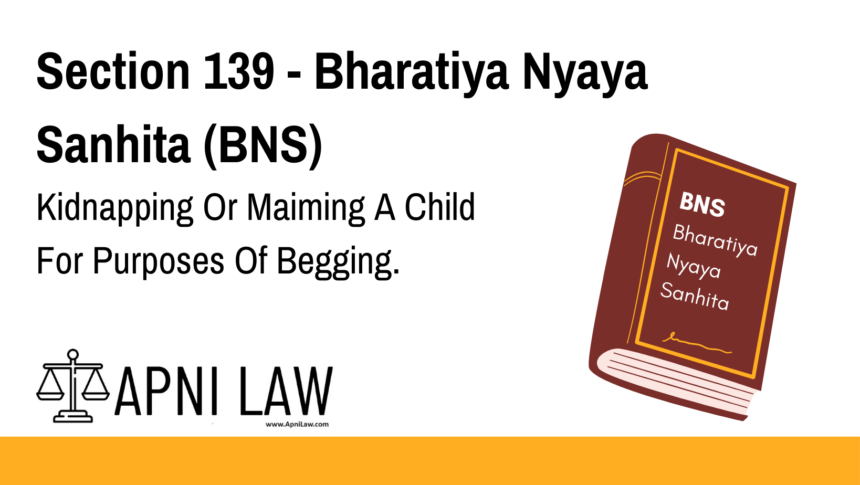Code:
(1) Whoever kidnaps any child or, not being the lawful guardian of such child,
obtains the custody of the child, in order that such child may be employed or used for the
purposes of begging shall be punishable with rigorous imprisonment for a term which shall
not be less than ten years but which may extend to imprisonment for life, and shall also be
liable to fine.
(2) Whoever maims any child in order that such child may be employed or used for the
purposes of begging shall be punishable with imprisonment which shall not be less than
twenty years, but which may extend to life which shall mean imprisonment for the remainder
of that person’s natural life, and with fine.
(3) Where any person, not being the lawful guardian of a child employs or uses such
child for the purposes of begging, it shall be presumed, unless the contrary is proved, that he
kidnapped or otherwise obtained the custody of such child in order that such child might be
employed or used for the purposes of begging.
(4) In this section “begging” means—
(i) soliciting or receiving alms in a public place, whether under the pretence of
singing, dancing, fortune telling, performing tricks or selling articles or otherwise;
(ii) entering on any private premises for the purpose of soliciting or receiving
alms;
(iii) exposing or exhibiting, with the object of obtaining or extorting alms, any
sore, wound, injury, deformity or disease, whether of himself or of any other person or
of an animal;
(iv) using such child as an exhibit for the purpose of soliciting or receiving alms.
Explanation:
Section 139 of the Bharatiya Nyaya Sanhita (BNS) aims to prevent the exploitation of children through kidnapping or maiming for begging. This section imposes severe penalties on individuals who engage in such acts, ensuring the protection of minors from forced begging and related abuses.
Key Provisions:
- Kidnapping for Begging: Anyone who kidnaps a child or takes custody unlawfully to use them for begging faces a minimum of 10 years of rigorous imprisonment, which can extend to life imprisonment along with a fine.
- Maiming for Begging: If a child is maimed (caused bodily harm or deformity) for the purpose of begging, the offender will face a minimum of 20 years of imprisonment, which may extend to life (entire natural life) along with a fine.
- Presumption of Guilt: If a person employs a child for begging, it will be presumed that they kidnapped or obtained custody unlawfully, unless they can prove otherwise.
- Definition of Begging: The law provides a broad definition of begging, including activities such as soliciting alms, performing for money, exhibiting wounds or deformities, and using children as exhibits to gain sympathy and collect money.
Illustration:
Example 1: Kidnapping for Begging
A gang abducts children from rural areas and brings them to cities, forcing them to beg on streets. Under Section 139 BNS, these criminals will face at least 10 years of rigorous imprisonment, which can extend to life imprisonment along with a fine.
Example 2: Maiming for Begging
A person deliberately injures a child’s limbs to make them appear helpless, increasing the likelihood of collecting alms. Under this section, the offender will face not less than 20 years of imprisonment, possibly extending to life imprisonment (natural life) and a fine.
Example 3: Presumption of Kidnapping
If a child is found begging under an unrelated adult’s control, the court will presume that the adult kidnapped the child unless they can prove otherwise. This ensures accountability and quick legal action.
Common Questions and Answers:
1. What is the minimum punishment under Section 139 BNS for kidnapping a child for begging?
The minimum punishment is 10 years of rigorous imprisonment, which can extend to life imprisonment along with a fine.
2. What happens if a person maims a child for begging?
If a person maims a child, they will be sentenced to a minimum of 20 years of imprisonment, which can extend to life (natural life) along with a fine.
3. How does the law presume guilt in cases of child begging?
If a person is found employing or using a child for begging, it is automatically presumed that they kidnapped or illegally obtained custody of the child, unless they can prove otherwise.
4. What is included in the definition of “begging” under this law?
The term “begging” includes:
- Soliciting alms in public through acts like singing, dancing, or selling items.
- Entering private premises to ask for alms.
- Exposing injuries or deformities to gain sympathy for financial benefit.
- Using a child as an exhibit to attract donations.
5. Can a person be punished for allowing a child to beg even if they did not kidnap them?
Yes, under Section 139(3) BNS, if a person employs or uses a child for begging, the law presumes they kidnapped or unlawfully obtained custody of the child, unless proven otherwise.
Conclusion:
Section 139 BNS plays a crucial role in safeguarding children from forced begging and physical harm. By imposing stringent penalties, it ensures that individuals exploiting minors face strict legal consequences. This law serves as a strong deterrent against such heinous crimes, reinforcing child protection and welfare.
For more legal insights and updates, visit ApniLaw today! 🚀








